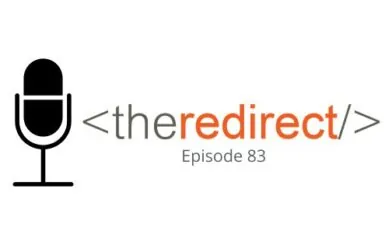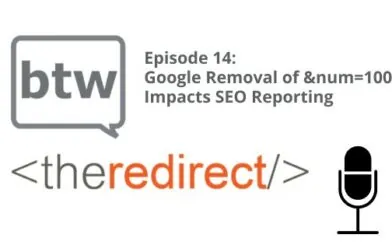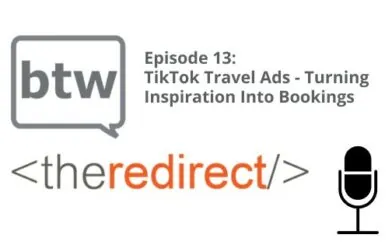When was the last time you Googled something? Now, when was the last time you asked an AI instead? In Episode 79 of The Redirect Podcast, host Adrienne Wallace and guest Jason Dodge dive into how search is evolving in the era of AI. From ChatGPT to Perplexity and Bing’s AI tools, they explore what it means to seek knowledge in a world moving from links to answers.
This episode unpacks the evolution of search behavior, the role of AI in shaping our trust in information, and how marketers and everyday users alike must adapt to this shifting digital landscape.
Why We Trusted Google for So Long
“Google didn’t just organize the world’s information — they branded search itself.“
Jason opens with a look at why we’ve been so loyal to Google. With over 90% market share and a reputation built on delivering fast, relevant results, it became synonymous with the act of searching. But that loyalty may have also led to complacency. Google’s shift from 10 blue links to an “answer engine” has been subtle but significant. Brands must adapt their SEO strategies to remain visible as Google evolves from a list of links to a source of direct answers.
“They’ve been in the answer business for a long time — not just links.” — Jason Dodge
AI and the New Rules of Search
Generative AI is transforming how we interact with search. Instead of offering a list of links, tools like ChatGPT provide synthesized, conversational responses. This shift introduces new friction: users must now learn how to ask better questions to get meaningful results.
“Prompt engineering is the new search skill.“
Adrienne and Jason debate whether AI is just another step in the evolution of search or something altogether different. And while AI tools can be efficient, they often reduce the depth and variety of discovery. Developing a robust content strategy ensures your information is discoverable, whether users are searching traditionally or via AI.
Search is no longer about just finding — it’s about asking.
Trust, Curiosity, and the Risk of Shallow Learning
The convenience of AI-generated answers may come at a cost.
“Are we getting faster answers, but becoming less curious in the process?” — Adrienne Wallace
AI can sound more confident than correct, which makes it feel trustworthy — but that’s a dangerous illusion. Jason points to the concept of AI as a peer, not just a tool. To be valuable, it requires feedback, challenge, and contextual understanding.
The duo also discusses the risk of outsourcing critical thinking. Digital literacy — once assumed — must now be re-taught. Investing in digital marketing consulting can equip teams to adapt their messaging and maintain audience trust.
Who Controls AI-Driven Information?
As Google rolls out AI Overviews by default, and as AI tools influence what we see (and what we don’t), the question becomes: who controls the gate?
“Just because it feels human doesn’t mean it’s telling the truth.”
The episode highlights how opaque the moderation and training of AI models can be. Unlike traditional search algorithm updates, AI changes are broad and largely invisible. For marketers, this presents a brand safety and discoverability challenge.
Is AI Replacing Search or Evolving It?
Adrienne and Jason agree: AI isn’t killing search, it’s evolving it. People may still start their journey on Google, but they now have a broader set of tools to explore — whether it’s Pinterest for visual planning or Reddit for raw opinions.
“Think of search as a map. AI is becoming the tour guide.“
In practice, marketers must adapt their strategies to align with both traditional and AI-augmented search behaviors. Proficiency, not panic, is the goal.
Actionable Tips for Marketers
- Don’t freak out — Google, OpenAI, and Meta will continue to change. Your strategy should evolve, not react.
- Audit your content for clarity, structure, and value to both users and AI engines.
- Adopt AI as a collaborator, not a replacement. Use it to review, critique, and find gaps.
- Measure what matters — look beyond traffic to engagement and conversion metrics.
- Educate your team on prompt writing and digital literacy. These are now core skills.
“We’re not just SEOs anymore – we’re psychologists of the web.” — Jason Dodge
Final Thoughts
AI is not the end of search — it’s a new chapter. It’s forcing users to think differently about how they seek and trust information. For marketers, it’s a call to refocus on empathy, clarity, and content that truly serves.
“It’s not about how we find stuff — it’s how we think about finding stuff.”
Stay curious. Stay skeptical. And maybe, try asking something beyond Google next time.



